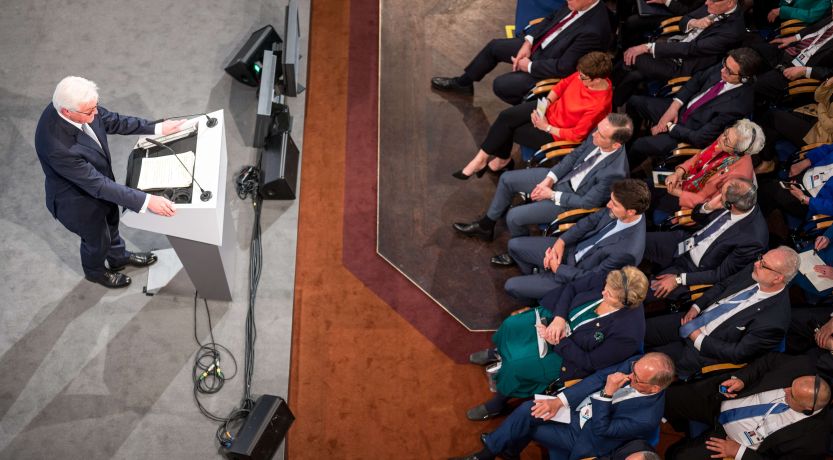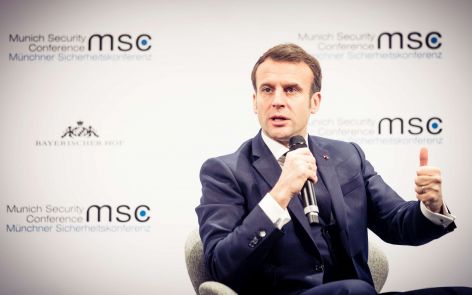A New “Westless” World Order?
With trust in global institutions decreasing and uncertainty increasing, Europe is pushing for more independence. How do these events fit into Bible prophecy?

German President Frank-Walter Steinmeier spoke at the MSC and warned that “if the European project fails, the lessons of German history will be called into question” (MSC/Barth-Tuttas).
The Munich Security Conference (MSC) is an annual conference held under the motto of “Peace Through Dialogue.” The event brings senior figures from over 70 countries together to engage in intense and interactive debates on the world’s pressing security issues and defense policies.
This year the MSC’s theme was “Westlessness.”
The organizers chose this theme to highlight the fragmentation and loss of common identity among the Western powers. They stated that “Westlessness” reflects “a widespread feeling of uneasiness and restlessness in the face of increasing uncertainty about the enduring purpose of the West.”
The first day of the conference was dominated by a rift between the U.S. and Europe over China. The U.S. insisted that China cannot be trusted with the rollout of 5G technology, yet Germany was still keen on using China for its rollout.
Germany hit back, challenging President Trump’s “America First” policy for derailing the international order. German President Frank-Walter Steinmeier specifically denounced the U.S. withdrawal from the Iran nuclear deal and President Trump’s conflicting statements on NATO. He also rebuked Russia and China for destabilizing global security in their “pursuit of ‘great power’ competition.”
U.S. Secretary of State Mike Pompeo attempted to counter the message by saying that “the death of the transatlantic alliance is grossly over-exaggerated,” and the U.S. does not reject the international community. He made the argument that the “West is winning.”
But Mr. Pompeo was followed by French President Emmanuel Macron, who countered Mr. Pompeo’s position by lamenting the “weakening of the West” and calling for more independence from the U.S. since Europe is no longer a junior partner on the international stage.
NATO Secretary General Jens Stoltenberg stated that rules-based institutions are under pressure from uncertainty and unpredictability and that the way to combat these is by trying to predict the future, which he acknowledged was “extremely difficult.” (He cited the fall of the Berlin Wall, the terrorist attacks of 9/11, and the rise of ISIS as destabilizing developments that NATO failed to predict.)
Yet he tried to assure Europeans that NATO can maintain their security, no matter what the future brings.
One thing was clear—the conference highlighted the ever-growing rift between the U.S. and Europe. Many Western leaders seem to believe we are seeing the beginning of the end of the relationship.
“A new idea of world order”
The conference encouraged European leaders to “escape their embrace of a status quo that no longer exists—and to begin to map a path towards a new idea of world order.”
The loudest voice for such a new order came from French President Emmanuel Macron, who has been championing his vision of a Europe militarily sovereign from the U.S. for several years now.
Speaking at the MSC, French President Emmanuel Macron called for a “much stronger Europe in defense” (MSC/Kuhlmann).
In an interview at the conference, Mr. Macron called for a “much stronger Europe in defense”—a call that has strengthened since Great Britain departed from the EU.
After Brexit, France is now the only EU nation with nuclear weapons, and Mr. Macron has proposed a “‘core’ group of EU nations moving towards a military union” with France sharing its nuclear weapons (instead of relying on the U.S. “nuclear umbrella,” a proposal NATO has so far rejected).
Emmanuel Macron also invited Germany into discussions about nuclear weapons. That is significant because Germany has been extremely hesitant to take a military lead in Europe due to its World War II legacy and the Holocaust.
But recently German President Steinmeier has also called for Germany to take a more active role in Europe. He said: “This united Europe will only survive if we regard it as the most concrete repository for German responsibility … of all the dangers I sense facing Germany, I see none greater than that our German narrative of the future dispenses with the united Europe, whether as a result of a lack of insight, because of indifference, or in some people’s eyes even through intent.”
He also warned: “If the European project fails, the lessons of German history will be called into question.”
So there are multiple significant voices calling for Germany to take a more active and aggressive approach to preventing the demise of the European project. This conference surprised many in the push for Germany to “return to its traditional role as a motor for European unity.”
Guy Verhofstadt, a member of the European Parliament from Belgium, said: “The world order of tomorrow … is a world order based on empires.” He continued: “Let’s create a European defense union. Let’s take on our responsibilities. … Let’s become an empire.” And he promised it would be “an empire of the good and not of the bad.”
One reporter observed that he saw two opposing power blocs at the MSC—a German-led European bloc and the “the U.S. led Britain, Australia and New Zealand bloc”—with the blocs holding opposing views on NATO’s role in Europe.
How does this all fit into Bible prophecy?
Students of Bible prophecy are not surprised by these calls for Europe (and Germany) to take on a more powerful role on the world stage. The Bible prophesies that this will happen—but it will not turn out to be a benevolent “empire of the good.”
The book of Daniel prophesied that there would be four successive gentile empires (Daniel 2:32-40). These empires were historically fulfilled by the Babylonian, Persian, Greco-Macedonian and Roman empires.
The Roman Empire was depicted as different from the others (Daniel 7:19). It was to have “ten horns”—representing 10 kingdoms that would arise from the empire (verse 24). Unlike the others, which would fall and never rise again, the Roman Empire would rise (or be resurrected) 10 times before Christ’s return.
When we see the world being divided into a German-led European bloc versus a U.S.-led English-speaking bloc, we should be on alert!
The historical Roman Empire morphed into the Holy Roman Empire. The Holy Roman Empire was centered in various parts of Europe—mainly France and Germany. The ninth revival ended with the defeat of the Hitler-Mussolini alliance in 1945.
The final revival of the Holy Roman Empire will be a union of 10 European nations (or groups of nations). Instead of being brought into a European empire by force, these nations will voluntarily give their sovereignty to a central leader (Revelation 17:12).
Based on history and the present realities in Europe, it’s very likely that Germany will be the leading power in this future union. This 10th revival will amaze the world and be a great military and economic power (Revelation 13:4). But it will also contribute to a time of global war that will bring the earth to the brink of destruction (Matthew 24:21-22).
To learn more about this future European power, read “Who Is the Beast?”
These prophecies make Emmanuel Macron’s proposal for a “core group of EU nations moving towards a military union” particularly significant.
Another significant prophetic theme we see playing out is the fracture between Europe and the “Anglosphere” (particularly Great Britain and the United States). As we show in our booklet The United States, Britain and the Commonwealth in Prophecy, these two powerful English-speaking nations are identified in the Bible as Israel (particularly the sons of Joseph, Ephraim and Manasseh).
The Bible prophesies that the modern descendants of the Israelites will have their blessings removed and be punished for their national sins (Isaiah 5:20; Deuteronomy 28:45, 49-50). Though they used to be the most powerful nations in the world, they will become subservient to others (Leviticus 26:25)—particularly Europe.
So when we see the world being divided into a German-led European bloc versus a U.S.-led English-speaking bloc, we should be on alert!
Watch
We are living in extremely dangerous and momentous times. The world is currently going through instability and transition. This transition will ultimately culminate in the fulfilment of many Bible prophecies. It is going to continue to get worse. But the good news is it will ultimately get better.
Jesus Christ will return to establish the Kingdom of God on this earth—and institute a righteous government that will bring peace and an end to war.
Keep watching the world scene—and praying for Christ’s return.
Date Posted: March 13, 2020



